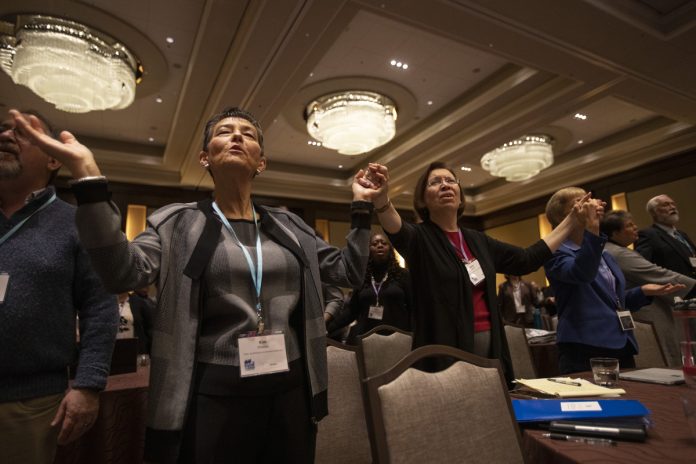What form The United Methodist Church takes next will remain unclear until the 2020 General Conference meets this spring.
In a gathering that emphasized the denomination’s uncertain future, United Methodists received a preview of some of the possibilities that will be before 862 delegates when they meet May 5-15 in Minneapolis.
“Minneapolis is likely to be our Massah, our testing place, and Minneapolis is likely to be our Meribah, our quarreling place,” said Minnesota’s Bishop Bruce Ough during an opening sermon based on Exodus 17.
But, he added, Minneapolis also “can be the place where God pours out God’s extravagant love and grace on a hurting, broken, anxious church and liberates us from our conflict.”
More than 400 delegates, communicators and other United Methodists who will be part of the 2020 General Conference attended the Jan. 23-24 preview event at the Omni Nashville Hotel. UM News and United Methodist Communications sponsored the event, with involvement and support from other agencies and ministries of the church.
Near the top of the agenda was an overview of various proposals to separate or, in one case, dissolve the denomination in hopes of ending the church’s decades-long dispute over how accepting to be of homosexuality.
The gathering also included presentations on other legislation that could affect United Methodist ministry.
This is a brief look at some of the issues explored. A number of topics covered in the briefing will be addressed in future stories by UM News. Those will include proposals affecting young people’s ministries, the status of women, the general church budget, ecumenical relationships and the future of ethnic-focused ministries.
Plans of separation
The rancorous special 2019 General Conference, by a 438-384 vote, tightened the denomination’s bans on same-sex weddings and “self-avowed practicing” gay clergy. However, those church rules have faced increasing resistance.
Confronted with what many see as irreconcilable differences, various groups of United Methodists have worked throughout 2019 on proposals to let the denomination split along theological lines.
Participants at the Nashville gathering heard from developers of four such proposals. These included “New Denominations of Methodism,” also known as the Indianapolis Plan; “New Expressions Worldwide” from UM-Forward; “Next Generation UMC” from UMCNext; and the “Protocol of Reconciliation & Grace Through Separation.”
By far the plan that has grabbed the most attention is the protocol. The proposal is a mediated agreement among bishops and leaders of advocacy groups with differing perspectives on LGBTQ inclusion. The plan resulted from discussions initiated by Sierra Leone’s Bishop John Yambasu.
“The uniqueness of this conversation was that it was broad; it was diverse,” said the Rev. Junius Dotson, a delegate from the Great Plains Conference and top executive of Discipleship Ministries. “It was initiated by central conference leaders; and of course, this conversation morphed into a conversation that was mediated by the world-renowned Ken Feinberg.”
Developers of the Indianapolis and UMCNext plans both contributed to the protocol, and presenters for each plan announced their groups’ backing of the newest proposal.
The protocol does not ask anyone to leave The United Methodist Church. However, it allows traditionalist congregations and conferences to separate and form a new denomination, while keeping their properties and getting $25 million in United Methodist funds.
It also reserves $2 million to help other new potential denominations and designates $39 million over eight years to strengthen Asian, African American, Hispanic-Latino, Native American and Pacific Islander ministries, as well as Africa University.
Still, the Rev. Jay Williams — a leader in UM-Forward and delegate from the New England Conference — voiced concerns about how the protocol came into being. He noted that UM-Forward and leaders of the denomination’s ethnic caucuses were not at the table. He also said that the protocol developers were the only plan backers who had a United Methodist Communications “press conference.”
UM-Forward developed the New Expressions Worldwide, or N.E.W., Plan that would dissolve The United Methodist Church and form four new global denominations instead.
“We believe dissolution is the faithful way forward,” said the Rev. Alka Lyall, one of the plan’s developers and a delegate from the Northern Illinois Conference.
Under the plan, the new denominations would align along traditionalist, moderate, progressive or liberation perspectives. UM-Forward, which seeks to center itself on people of color and LGBTQ individuals, sees itself in the last category.
The group’s vision of liberation, Williams explained, is “a spiritual and social way of living, a posture toward the future that is grounded in past struggle and present resilience that proclaims: We are loved into freedom.”
U.S. regional conference
Those at the Nashville meeting also heard about the proposed U.S. regional conference. The new structure would encompass the United States and maintain the current five U.S. jurisdictions.
The Connectional Table, a multinational body that coordinates money and ministry, began drafting the proposal long before GC2019 put the spotlight on church divisions.
The group’s goal is to have a body to take up matters that solely affect the U.S. church and ease the burden on the multinational General Conference. U.S. proposals often dominate the global lawmaking assembly.
Source: United Methodist News
All Content & Images are provided by the acknowledged source



